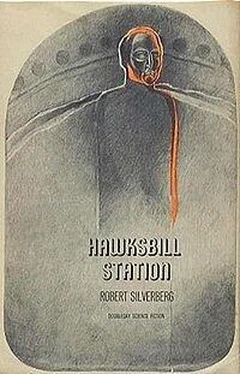“The former government?”
Hahn nodded. “The revolution came in January. Not really a violent one, either. The syndicalists just mildewed from within, and when they got the first push they fell over.”
“Was it mildew?” Barrett asked, coloring. “Or termites? Keep your metaphors straight.”
Hahn glanced away. “Anyway, the government fell, We’ve got a provisional liberal regime in office now. Don’t ask me much about it. I’m not a political theorist. I’m not even an economist. You guessed as much.”
“What are you, then?”
“A policeman,” Hahn said. “Part of the commission that’s investigating the prison system of the former government. Including this prison.”
Barrett looked at Quesada, then at Hahn. Thoughts were streaming turbulently through him, and he could not remember when he had last been so overwhelmed by events. He had to work hard to keep from breaking into the shakes again. His voice quavered a little as he said, “You came back to observe Hawksbill Station, right? And you went Up Front tonight to tell them what you saw here. You think we’re a pretty sad bunch, eh?”
“You’ve all been under heavy stress here,” Hahn said. “Considering the circumstances of your imprisonment—”
Quesada broke in. “If there’s a liberal government in power now and it’s possible to travel both ways in time, then am I right in assuming that the Hawksbill prisoners are going to be sent Up Front?”
“Of course,” said Hahn. “It’ll be done as soon as possible. That’s been the whole purpose of my reconnaissance mission. To find out if you people were still alive, • first, and then to see what shape you’re in, how badly in need of treatment you are. You’ll be given every available benefit of modern therapy, naturally. No expense spared—”
Barrett scarcely paid attention to Hahn’s words. He had been fearing something like this all night, ever since Altman had told him Hahn was monkeying with the Hammer, but he had never fully allowed himself to believe that it could really be possible.
He saw his kingdom crumbling.
He saw himself returned to a world he could not begin to comprehend—a lame Rip Van Winkle, coming back after twenty years.
He saw himself leaving a place that had become his home.
Barrett said tiredly, “You know, some of the men aren’t going to be able to adapt to the shock of freedom. It might just kill them to be dumped into the real world again. I mean the advanced psychos—Valdosto, and such.”
“Yes,” Hahn said. “I’ve mentioned them in my report.”
“It’ll be necessary to get them ready for a return in gradual stages. It might take several years to condition them to the idea. It might even take longer than that.”
“I’m no therapist,” said Hahn. “Whatever the doctors think is right for them is what’ll be done. Maybe it will be necessary to keep them here. I can see where it would be pretty potent to send them back, after they’ve spent all these years believing there’s no return.”
“More than that,” said Barrett. “There’s a lot of work that can be done here. Scientific work. Exploration. I don’t think Hawksbill Station ought to be closed down.”
“No one said it would be. We have every intention of keeping it going, but not as a prison.”
“Good,” Barrett said. He fumbled for his crutch, found it and got heavily to his feet. Quesada moved toward him as though to steady him, but Barrett shook him off. “Let’s go outside,” he said.
They left the building. A gray mist had come in over the Station, and a fine drizzle had begun to fall. Barrett looked around at the scattering of huts. At the ocean, dimly visible to the east in the faint moonlight. He thought of Charley Norton and the party that had gone on the annual expedition to the Inland Sea. That bunch was going to be in for a real surprise, when they got back here in a few weeks and discovered that everybody was free to go home.
Very strangely, Barrett felt a sudden pressure forming around his eyelids, as of tears trying to force their way out into the open.
He turned to Hahn and Quesada. In a low voice he said, “Have you followed what I’ve been trying to tell you? Someone’s got to stay here and ease the transition for the sick men who won’t be able to stand the shock of return. Someone’s got to keep the base running. Someone’s got to explain to the new men who’ll be coming back here, the scientists.”
“Naturally,” Hahn said.
“The one who does that—the one who stays behind—I think it ought to be someone who knows the Station well, someone who’s fit to return Up Front, but who’s willing to make the sacrifice and stay. Do you follow me? A volunteer.” They were smiling at him now. Barrett wondered if there might not be something patronizing about those smiles. He wondered if he might not be a little too transparent. To hell with both of them, he thought. He sucked the Cambrian air into his lungs until his chest swelled, grandly.
“I’m offering to stay,” Barrett said loudly. He glared at them to keep them from objecting. But they wouldn’t dare object, he knew. In Hawksbill Station, he was the king. And he meant to keep it that way. “I’ll be the volunteer,” he said. “I’ll be the one who stays.”
He looked out over his kingdom from the top of the hill.












